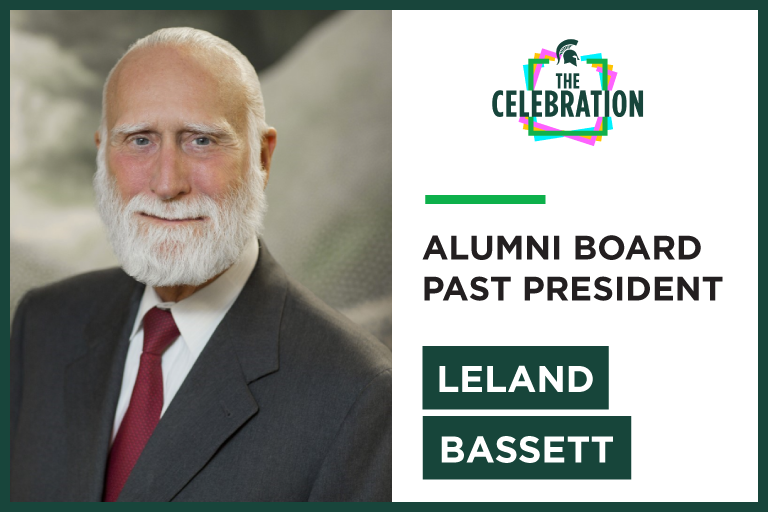Leland Bassett
Chairman and CEO, The Bassett Business Group; and Bassett & Bassett Communication Managers and Counselors
Bassett is a 1968 communication graduate and 1992 recipient of the Outstanding Alumni Award. Bassett served as president of the ComArtSci alumni board from 1980 to 1981.
What was it like serving as president of the ComArtSci alumni board?
MSU CCAS ComArtSci was giving birth to a new academic field of a data-driven, empirical sciences approach to human communication behavior, and then integrating that with the traditional communication arts – the first college in the nation, and even in the world, to do so. It was considered radical by the “establishment” then, but in keeping with the MSU tradition as the nation’s first “Land Grant College” [1855] introducing the development and application of knowledge for practical uses to benefit humankind – it’s in our DNA.
Being a charter member and then president of the ComArtSci alumni board helped in building a community of researchers and application practitioners needed then to carve out our “legitimacy” in a new field that was challenging thousands of years of “rhetoric and public address” orthodoxy. It was a great source of friendship, validation and continuing education.
How has your MSU degree or experience benefited your career?
My MSU CCAS ComArtSci experiences gave me the foundation to introduce important change – often initially strongly resisted – in the business and professional services fields. The ComArtSci field was so new in the late sixties that I was the first graduate student who did not want to become a “knowledge generation” Ph.D. researcher but advocated for a “knowledge utilization” track for the application of the knowledge, in what has become more commonly known as “strategic communication management.”
I had the great fortune to be mentored by communication department chair Dr. David K. Berlo, who’s seminal 1960 “The Process of Human Communication” marked the “birth” of the field, and MSU CCAS ComArtSci assistant dean Dr. Larry Sarbaugh, whose agricultural extension roots led him to introduce and support models for “knowledge utilization.” It is especially gratifying to see that the seed from my 1968 pursuit is now the Master of Arts in Strategic Communication program. MSU CCAS ComArtSci helps me grow every day.
What is your hope for the future of ComArtSci?
MSU CCAS ComArtSci dean Dr. Prabu David has brought a refreshing and much needed revitalization to outreach and the value of career applications of the integration of research, and “field” utilization of our increasing knowledge base. We have both an opportunity and need to engage and support our alumni in both research and career applications.
The C-suite and senior leaders too often still sees “communication” in old sender-oriented models. We see more career members moving up in organizations equipped with the ever-expanding ComArtSci models of integrated, dynamic, data-driven human communication behavior. Alumni can and must reach out to assist them, and to advocate for the continuing diffusion and use of our knowledge.
We are still professionally in the Rogers and Shoemaker “Diffusion of Innovations” curves – originated at MSU CCAS ComArtSci – and we need to continue to help make a difference and improve the quality of life of our brothers and sisters on this little spaceship called Earth. It is our generational responsibility, and the pay-it-forward we owe those who helped us. It’s part of our “Spartans Will” and land-grant heritage DNA. It gives broader meaning to “Go Green.”
